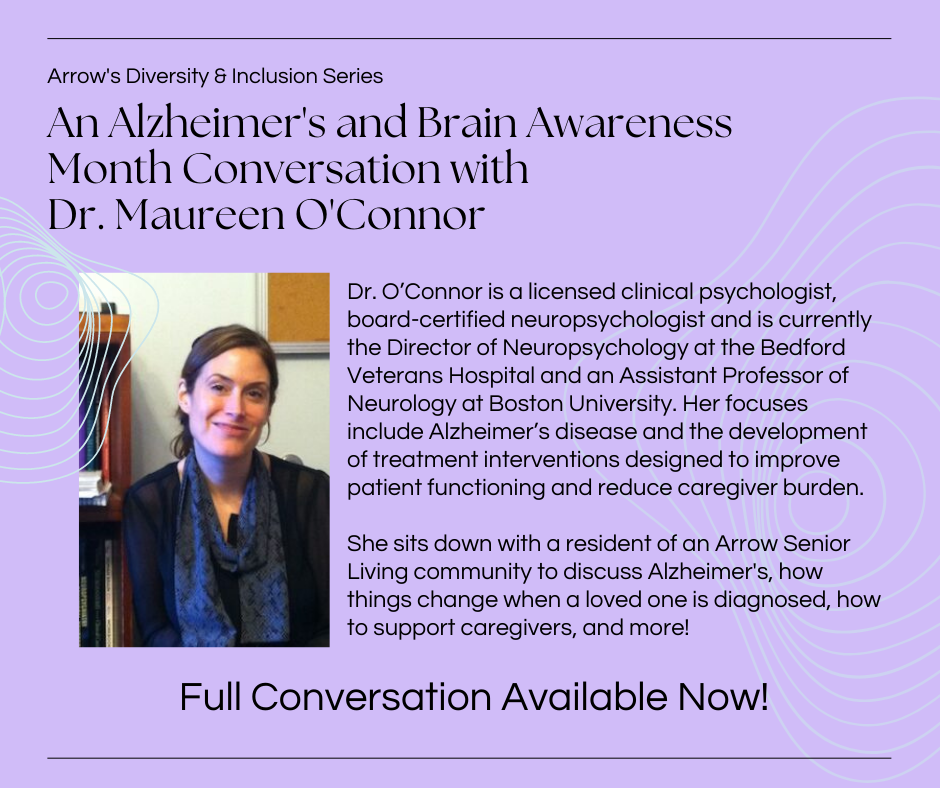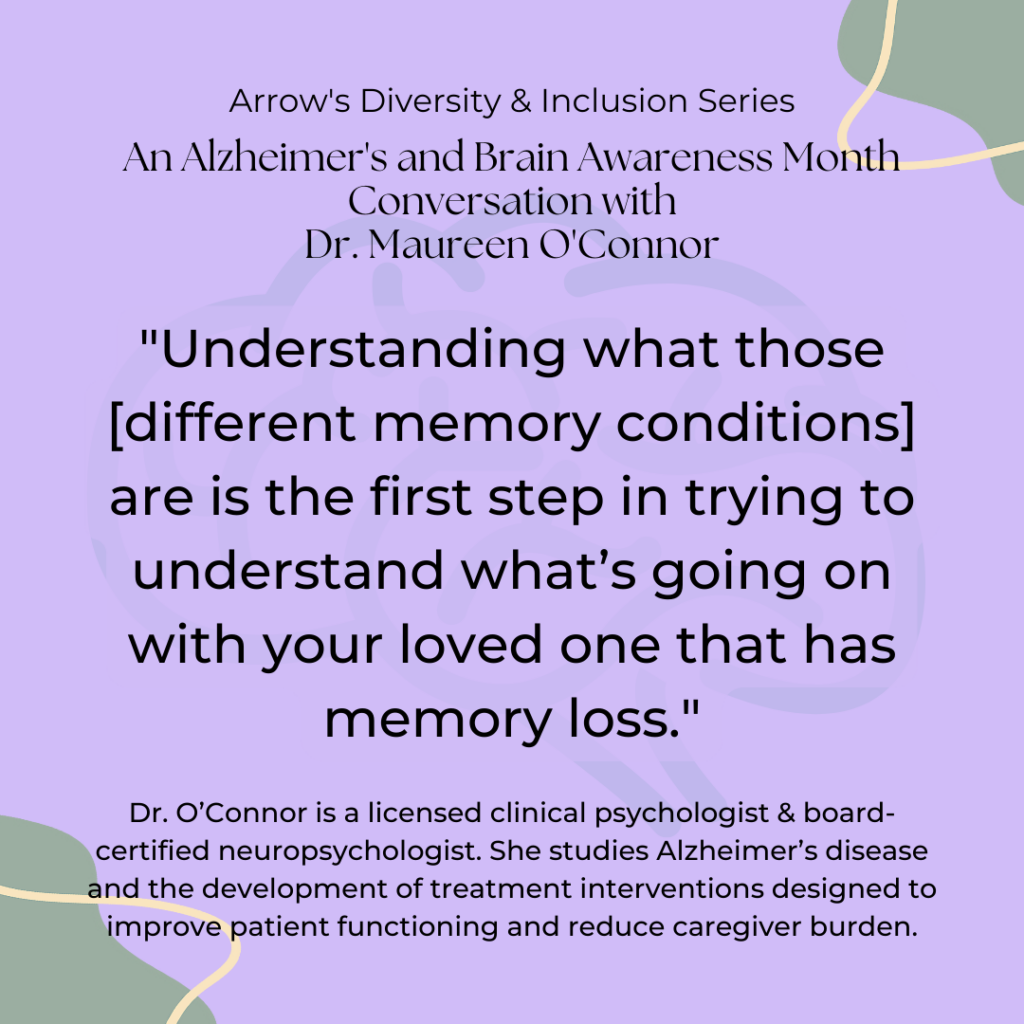
June 21, 2023

Dr. Maureen O’Connor is a Neuropsychologist who works with patients and families in a clinical setting, typically older adults worried about their memory and thinking. She was interviewed by Don Bobula, a resident of an Arrow senior living community, who has experienced, first-hand, how dementia can affect a loved one and a relationship.
When it comes to diagnosing dementia, it often begins with pencil and paper testing to understand if what the individual is experiencing is part of the normal aging process or if there might be something else going on.
“I offer diagnosis to the person and family members, and recommendations,” said O’Connor. “I also meet with families for more extended times to help them understand the diagnosis better, understand problems, their own emotions, or reactions to the situations they find themselves in.”
There are several different conditions that can affect memory and thinking as we get older,
making the journey to getting the initial diagnosis difficult. Understanding what those conditions are is the first step in trying to understand what is going on with someone that has memory loss. That can be quite a process. “People aren’t always on the same page,” says O’Connor. “The person suffering from memory loss may not be as cooperative with getting an evaluation or seeing a specialist or a doctor, and that can be difficult.”
Mr. Bobula experience first-hand his wife’s early experience of memory loss. At first there were very suble clues, her wanting to call her mother-in-law that had passed years prior and calling her children in the middle of the night. Don played it off as, “a little bit of forgetfulness.” Then, the situation became more serious when she drove three miles to the police statation at 3:00 am and didn’t know how to get back home. Two days later, in the night, she stood on the curb screaming for help. This was the beginning of Marleene’s dementia journey.
The next part of the journey is receiving and dealing with a diagnosis, trying to understand what that means for your lives, what you need to do moving forward, and what you need to prepare for. Because these are progressive diseases, there is the reality of having to manage changes in memory, thinking, behavior, and functioning. Dr. O’Connor stated, “There are certain changes that are predictable and common to the disease, if you know the diagnosis, and others that may be idiosyncratic to the person that has dementia. It can be difficult to navigate because it is a changing landscape.”
Dementia can be difficult and misunderstood. It is a broad term that refers to three criteria that needs to be met for a diagnosis:
“Saying that someone has dementia is just like saying someone has a headache. It doesn’t tell you the why, the cause of the dementia. I, as a specialist, think it is very important to understand the cause. If someone says you or a loved one has dementia, the next important question is, what is causing the dementia,” stated O’Connor.
There are multiple types of dementia. Alzheimer’s Disease is the most common cause for people over the age of 65. Lewy Bodies dementia involves changes in physical function, sometimes visual hallucinations. For individuals under the age of 65, the most common dementia is Frontotemporal, which primarily involves personality change. According to O’Connor, dementia is not something most older adults experience. Only 10% of adults in the US over 65 have dementia and only 33% for those over 85. Dementia is a disease of the aging brain. It is common for everyone to experience normal memory loss as they age.
Caregivers of loved ones with dementia will observe them having increased problems with memory and thinking. Personality changes are also common. These things will impact what the loved one will be able to do in everyday life. A plan will need to be put in place. “In the shadow of all these changes, it is very common for families to also be managing family dynamics related to who is going to provide care, what decisions need to be made about the future, and there is the emotional toll the disease takes,” said O’Connor.
She reminds caregivers “you can’t pour from an empty cup” and you need to make sure you are also taking care of yourselves. That can be very difficult for caregivers and family members of someone with memory loss. Often caregivers are so focused on taking care of their loved one, they stop taking care of themselves. O’Connor stresses the importance of supporting caregivers, even with small gestures, calling to say hello, checking in, being a shoulder, inviting them for a walk, or spending time together. Also, acts of service can make a huge difference. Offer to pick up prescriptions, mow the lawn, or spend time with the person with memory loss.
Being a caregiver for a long-time partner can be especially difficult. O’Connor reminds us that relationships always change over time, they are dynamic and can be fluid. “I do strongly believe the relationship one has with someone that has memory loss can be meaningful. Not to say the relationship will be the same,” she continued. “I believe you can still find meaning in the relationship and moments of joy. The simple act of holding the hand of someone, even in the later stages, is something you can do when you wonder, how can I still connect to the person I love.”
Mr. Bobula commented, “I always use this analogy. When you’re flying on a plane and the oxygen masks drop down, and the oxygen level is decreasing, you must put it on your face first, so you can help the person you want to help.”
“One of the things I said in our early stages of meeting my wife, “I want someone that needs me more than I need them.” I didn’t know what I was asking for. I needed what Marleene has, compassion, gentleness, kindness, the manners. She made me what I am today. When you get what you ask for, you better watch out, you might get too much need and you’re not taking care of yourself,” Mr. Bobula reminds us.
In addition to her clinical work, Dr. O’Connor also works in the research world. “I’m very interested in doing research to help understand the lived experience of persons with dementia and their family members and using that understanding to creating interventions that can be helpful.”
Saint Charles, Missouri-based Arrow Senior Living manages a portfolio of communities that offer varying levels of care, including independent living, assisted living, and memory care. Each and every senior living community supports residents by focusing on dignity, respect, and quality of life. The programs and amenities offered are selected to provide only the highest standard of quality and comfort.
Find an Arrow community near you
Work at Arrow Senior Living
Arrow Senior Living Management serves and employs individuals of all faiths, regardless of race, color, gender, sexual orientation, national origin, age or handicap, except as limited by state and federal law.